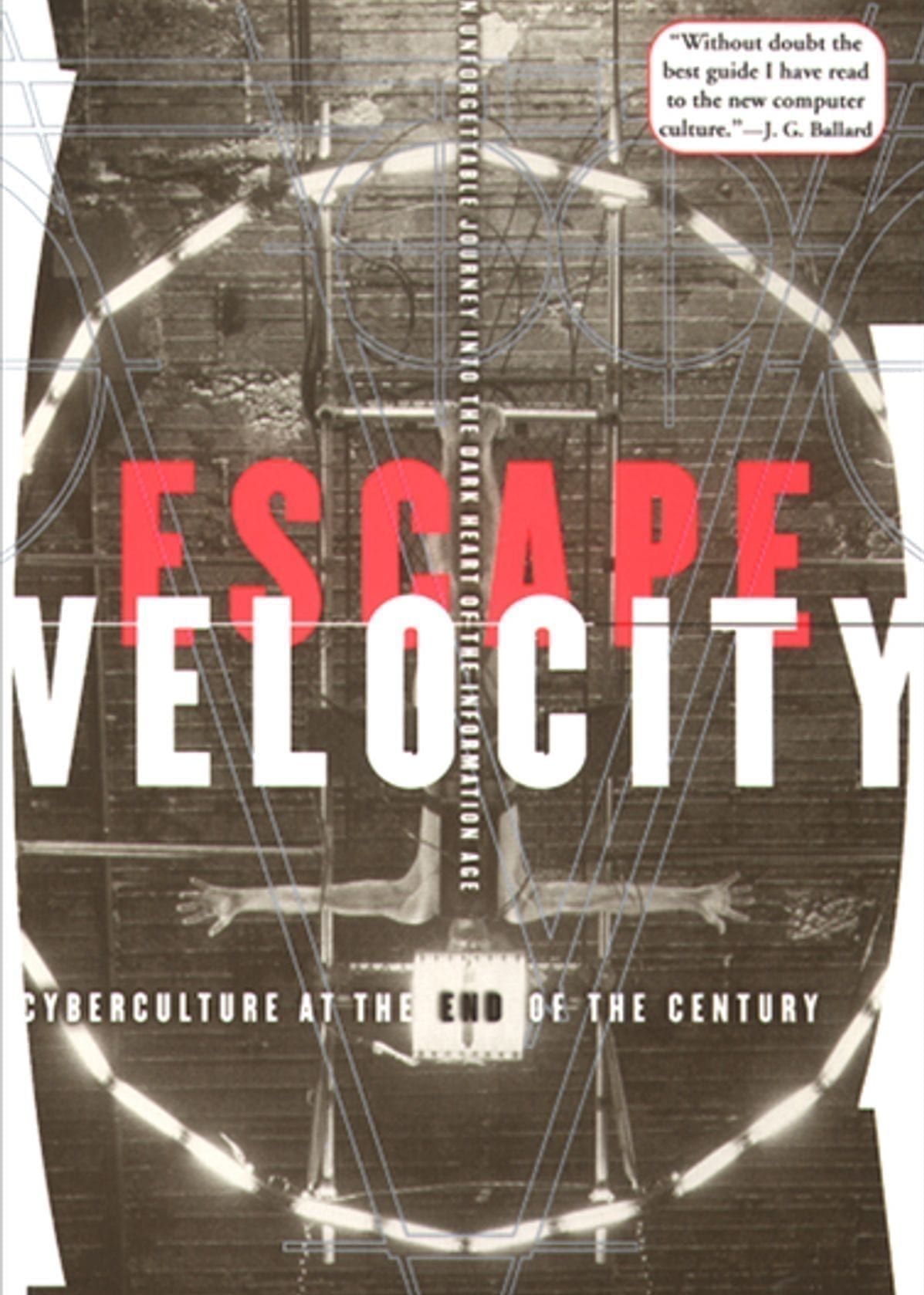Jacket description:
“An unforgettable journey into the dark heart of the Information Age, Escape Velocity explores the high-tech subcultures that both celebrate and critique our wired world: cyberpunks, cyberhippies, technopagans, and rogue technologists, to name a few.
The computer revolution has given rise to a digital underground–an Information Age counterculture whose members are utilizing cutting-edge technology in ways never intended by its manufacturers. Poised, at the end of the century, between technological rapture and social rupture, between Tomorrowland and Blade Runner, fringe computer culture poses the fundamental question of our time: Will technology liberate or enslave us in the coming millennium?
Mark Dery takes us on an electrifying tour of the high-tech underground. Exploring the shadowy byways of cyberculture, we meet would-be cyborgs who believe the body is obsolete and dream of downloading their minds into computers, cyberhippies who boost their brainpower with smart drugs and mind machines, on-line swingers seeking cybersex on electronic bulletin boards, techno-primitives who sport “biomechanical” tattoos of computer circuitry, and cyberpunk roboticists whose Mad Max contraptions duel to the death before howling crowds. Most “cyber-” titles are a breathless mix of New Age futurism and gadget-happy cyberhype.
Escape Velocity stands alone as the first truly critical inquiry into cyberculture. Shifting the focus of our conversation about technology from the corridors of power to disparate voices on the cultural fringes, Dery wires it into the power politics and social issues of the moment. Timely, trenchant, and provocative, Escape Velocity is essential reading for everyone interested in computer culture and the shape of things to come.”
Praise for Escape Velocity:
“Cyberculture has long needed a savvy critique by someone who understands what it is all about, who isn’t afraid of participating in and directly observing the object of his critique. Dery goes beyond letting the air out of the tires of techno-utopia. His report from the hairy fringes of cyberculture forces us to examine the possibility that literal lust for technology is not just seducing us, but converting us into something other than human.” – Howard Rheingold
Press for Escape Velocity:
“Dery, to be sure, was one of the brightest and original extrapolators of subcultures sprouting up in the salad days of cyberpunks and Netscape…Flame Wars: The Discourse of Cyberculture – a benchmark anthology by and for ‘information wants to be free’ intellectuals – which came packaged with fascinating-yet-esoteric essays with florid titles like ‘New Age Mutant Hackers’ and ‘Compu-Sex: Erotica for Cybernauts.’ And his late-1990s follow-ups, Escape Velocity: Cyberculture at the End of the Century (1996), along with The Pyrotechnic Insanitarium: American Culture on the Brink (1999), were voyeuristic chronicles of phenomena like ‘cyber-hippies’ turning on with smart drugs and mind machines, cybersex phasing out physical intimacy, and the looming of the technological singularity.” – Eric Been, L.A. Review of Books
“[T]here’s no denying that Mr. Dery is an indefatigable reporter who has put together a lively compendium of dispatches from the far reaches of today’s computer-savvy avant-garde. He knows as much about cyberpunk science fiction as he does about cybersex bulletin boards, and he can quote Teilhard de Chardin and Tattoo Flash magazine to equal effect. If you have never heard of Shinya Tsukamoto’s cult movie ”Tetsuo: The Iron Man”–which Mr. Dery describes as ”a descent into a maelstrom of body loathing, cyborg fantasies, mechano-eroticism, information anxiety, agoraphobia, castration complexes and fear of phallic mothers”–then this book is your ideal guide to the cultural complexities of the computer age.” – Gerald Jonas, The New York Times
“Dery writes with considerable knowledge and authority about these bizarre subcultures, using the critical theories of Bataille, Foucault, and Baudrillard (not to mention McLuhan) to situate them in context with other developments in our postmodern culture. His writing, however, is happily, sometimes even exuberantly nonpedantic. In fact, he manages to give the lay reader a lively and informative tour through the darker recesses of cyberculture, navigating its jargon-filled byways with an observant eye and a healthy skepticism regarding its messianic message.” – Michiko Kakutani, The New York Times Book Review
“Freelance cultural critic Dery takes readers on a strange, unsettling, often provocative tour through fringe computer subcultures. We meet cyber-hippies and ‘technopagans’ who use the personal computer in New Age mystical rituals… California roboticist Mark Pauline stages spectacles in which robots and humans are menaced by heavy machinery or remote-controlled weaponry, while Chico MacMurtrie’s puppet-like robot musicians, acrobats and warriors enact eco-topian dramas. Australian cybernetic body artist Stelarc, plastered with electrodes and trailing wires, embodies the human/machine hybrid all of us are metaphorically becoming. Dery also profiles online swingers hooked on virtual sex, cyberpunk rockers, cyberpunk novelist William Gibson and D.A. Therrien’s performance ensemble Comfort/ Control, which dramatizes popular anxieties over the autonomy of intelligent machines and the nightmare of humanity’s obsolescence. Dery closes this adventurous inquiry with an appraisal of the ‘posthumanist’ visions of novelist William Burroughs, techno-mystical SF author Vernor Vinge and Carnegie-Mellon roboticist Hans Moravec.” – Publisher’s Weekly

